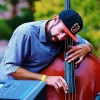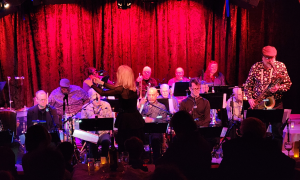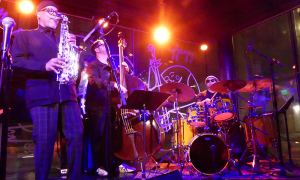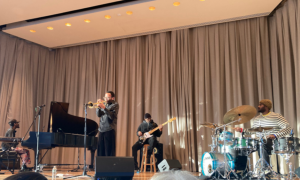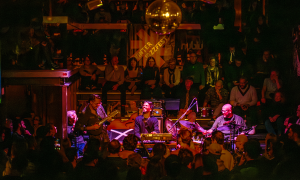Home » Jazz Articles » Live Review » Pianist James Williams Re-Opens Defunct Jazz Dive
Pianist James Williams Re-Opens Defunct Jazz Dive
His beaming smile and all-around good nature put him in even better stead with patrons who already adore him for his animated repartee on stage.
 Audience rapport is the true key for pianist James Williams. The Memphis-born Jazz Messenger alum has an urbane aura in his voice and his mannerisms that translate to his playing. He is a torch pianist much in the Ellingtonian tradition and fittingly has a special penchant for Strayhorn’s main d’oeuvre.
Audience rapport is the true key for pianist James Williams. The Memphis-born Jazz Messenger alum has an urbane aura in his voice and his mannerisms that translate to his playing. He is a torch pianist much in the Ellingtonian tradition and fittingly has a special penchant for Strayhorn’s main d’oeuvre. What strikes me about Williams is not that he knows virtually every song in the jazz, pop, classical, and gospel canons; or his keen sense of melody; or even his inspired harmonic ingenuity. Next to today’s crop of what the magazines brand “innovative” composer-players, his style might strike you a bit antediluvian. I’d say the main reason is the fact that he likes to play standards. And he does so in stunning form.
Isn’t there something to be said for being able to play any song in the book? And in any key? This is how all the great players came up. Why should Williams not play the music he loves? He brings vigor, vibrancy, and innovation every tune, his own or someone else’s.
My most recent dose of Williams came at a two-night visit to Twins Lounge. Though many audience members were personal friends of the pianist, those who weren’t were treated as such. The varied melange of standards, originals, solo musings, and jocular repartee brought everyone together in a way that few artists are able to achieve.
After two praise-filled introductions, one by Twins’ artistic director and website guru Paul Milesi, the other by a DC radio stalwart, Rusty Hassan – Williams started the first set with a classic, Vernon Duke’s “Takin’ a Chance on Love.” At the end of the first few songs, as is his habit, Williams takes up the microphone and starts to ramble, expressing his sincere pleasure at “seeing all [his] friends out to support live music.” He then introduces the band, which consists of bassist Michael Bowie and drummer Howard “Kingfish” Franklin, two in-demand session players in the DC area.
After rambling on and on about nothing, Williams quietly places the microphone down, closes his eyes and pauses for a few moments. He is racking his brain for the next tune. This time it’s Joe Henderson’s Latin-tinged classic “Recorda Me” from the tenor saxophonist’s exemplary 1963 Blue Note release, Page One. And just like that the rhythm section catches onto his intro and they all hit the downbeat together as if they were all in the same body.
Later in that set, Bowie, Franklin, and the veteran pianist pulled off exquisitely executed renditions of Billy Strayhorn’s “Lush Life” and “Chelsea Bridge,” Harry Warren’s “There Will Never Be Another You.”
Outside the clubs, Williams has played a pivotal role as an artist and educator. His successful stewardship of the jazz program at William Paterson University in Wayne, New Jersey has elevated him to celebrity status. His picture often graces the pages of Down Beat, Jazz Times, and other industry publications in the school’s advertisement – with a list of faculty that’s a who’s who of New York jazz musicians. Many members of the storied Vanguard Jazz Orchestra currently serve as adjunct faculty at Paterson.
As an artist, Williams has come a long way from his soul and gospel days as a youngster in Memphis. After graduating from Memphis State University Williams relocated to Boston, where he landed a teaching job at Berklee (1972-1977). During this period he had a chance to play with many masters of the music including trumpeters Woody Shaw, Art Farmer, Clark Terry and saxophonist Joe Henderson as well as fellow Berklee staff member drummer Alan Dawson.
Greater recognition came in 1977 when he became the pianist in Art Blakey’s Jazz Messengers. This four-year “gig of gigs” put Williams in excellent standing and helped him form many of his most important connections in the jazz world. While in the Messengers he met Billy Pierce, a severely underrated tenor and soprano saxophonist who currently teaches at Berklee.
Williams, a constant creator has his hand in several bands. One is his combined instrumental-vocal group, James Williams & the Intensive Care Unit (ICU), which toured extensively this past spring. In this group he has worked with saxophonists Pierce, Steve Wilson, Javon Jackson, bassists John Lockwood and Christian McBride, drummers Tony Reedus and Yoron Israel. The male vocalists are raspy-voiced Miles Griffith, and the more urbane yet edgy tenor of Roger Holland. On their later 1998 CD, they feature female vocalists Etta Jones, Vanessa Rubin, and Dianne Reeves.
In addition Williams is the leader and founder of the Contemporary Piano Ensemble, which includes five pianists rotating in a circular musical chairs motion on four grand pianos and a rhythm section. The five pianists are Williams, Mulgrew Miller, Donald Brown, Harold Mabern, and Geoff Keezer (by far the youngest member of the group). The bassist is John Lockwood and the drummer is Yoron Israel, both of whom currently teach at Berklee. All five pianists were inspired by the work of the relatively unknown inspired late pianist Phineas Newborn (pronounced Finas). The group rarely gigs these days but is a joy to see.
 After the first set at Twins, Williams takes his time in genuinely thanking everyone who complements him on a thoroughly pleasing set. His beaming smile and all-around good nature put him in even better stead with patrons who already adore him for his animated repartee on stage. This helps his CD sales for the night – many audience members new to the pianist buy one of his several recent CDs, which feature Williams doing duo recordings with the best in the business from Billy Pierce to John Patitucci to Mary Stallings. All four CDs are part of a set called Jazz Dialogues on a Japanese label – evidence of great musical promise but a lack of interest by U.S. labels. Williams used to record for a subsidiary of Columbia Records before it’s notorious purge of it’s heralded jazz roster, which also included Wynton Marsalis. ( It is the humble opinion of this author that Williams would fit rather nicely into the piano roster on the MAXJAZZ record label. )
After the first set at Twins, Williams takes his time in genuinely thanking everyone who complements him on a thoroughly pleasing set. His beaming smile and all-around good nature put him in even better stead with patrons who already adore him for his animated repartee on stage. This helps his CD sales for the night – many audience members new to the pianist buy one of his several recent CDs, which feature Williams doing duo recordings with the best in the business from Billy Pierce to John Patitucci to Mary Stallings. All four CDs are part of a set called Jazz Dialogues on a Japanese label – evidence of great musical promise but a lack of interest by U.S. labels. Williams used to record for a subsidiary of Columbia Records before it’s notorious purge of it’s heralded jazz roster, which also included Wynton Marsalis. ( It is the humble opinion of this author that Williams would fit rather nicely into the piano roster on the MAXJAZZ record label. )
Certainly there is merit to new compositions and hopefully someday the contemporary songs of today will one day be standards. But there is also merit to keeping the tradition alive by playing the standards and that is exactly how James Williams is so capable of connecting with audiences wherever he goes, whether it’s New York, Memphis, London or Tokyo.
For more information on James Williams or his latest CDs visit www.jameswilliamspiano.com or www.finasmusic.com .
Tags
PREVIOUS / NEXT
Support All About Jazz
 All About Jazz has been a pillar of jazz since 1995, championing it as an art form and, more importantly, supporting the musicians who make it. Our enduring commitment has made "AAJ" one of the most culturally important websites of its kind, read by hundreds of thousands of fans, musicians and industry figures every month.
All About Jazz has been a pillar of jazz since 1995, championing it as an art form and, more importantly, supporting the musicians who make it. Our enduring commitment has made "AAJ" one of the most culturally important websites of its kind, read by hundreds of thousands of fans, musicians and industry figures every month.







